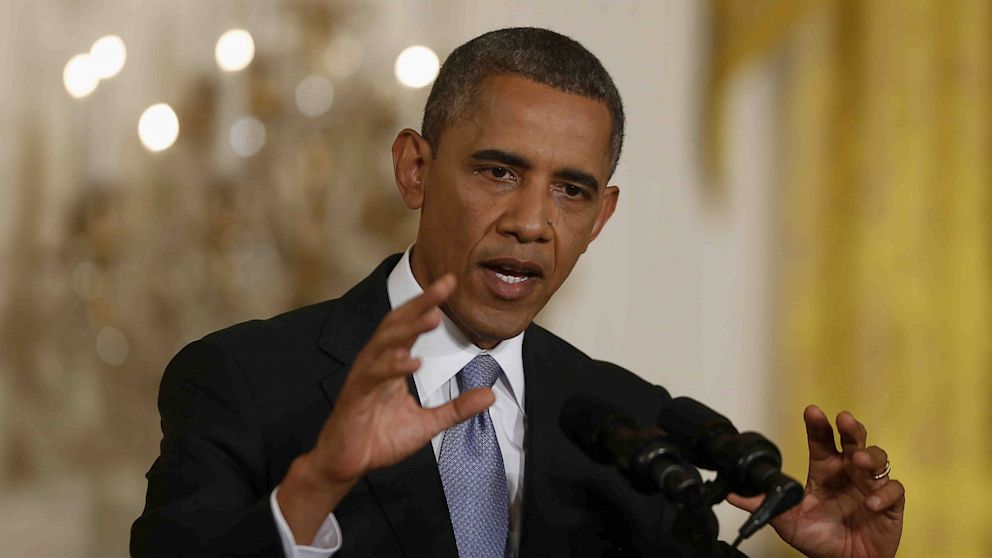President Obama's Own Experts Recommend End to NSA Phone Data Spying
Report: "Americans must never make mistake of wholly 'trusting' officials."

Dec. 18, 2013 — -- In another blow to the NSA's widespread electronic surveillance programs, President Barack Obama's own panel of experts today recommended an end to the NSA program that collects the telephone records of virtually every American, concluding it was "not essential to preventing attacks" and presents a "lurking danger of abuse."
"We think there's no real need for the government to store data about people's telephone calls," said Richard Clarke, a member of the panel and an ABC News consultant.
The recommendation was one of 46 in a 300-page report presented to the President today by the five members of the President's Review Group on Intelligence and Communications Technologies.
The panel said it concluded the NSA has done work that has prevented terror attacks and said it found no actual evidence of abuse by the NSA in its collection programs.
But its report warned, "We cannot discount the risk, in light of the lessons of our own history, that at some point in the future, high-level government officials will decide that this massive database of extraordinarily sensitive private information is there for the plucking."
ORIGINAL DOCUMENTS: NSA Panel's Executive Summary | Panel's 46 Recommendations
The collection of so-called "telephony meta-data" by the government under Section 215 of the Foreign Intelligence Surveillance Act was ruled unconstitutional earlier this week by federal district Judge Richard J. Leon in Washington, D.C. Metadata generally refers to information about the calls, such as origin, destination and duration, but does not include the content of the communication.
The White House panel said it supports legislation introduced by Sen. Patrick Leahy (D-VT) and Rep. James Sensenbrenner (R-WI), which would terminate the 215 program and end what Sensenbrenner called "the dragnet collection of Americans' phone records."
"We recommend that Congress should end such storage and transition to a system in which such metadata is held privately for the government to query when necessary for national security purposes," the panel report says.
In calling for sweeping curbs on the NSA, the panel said stressed the need for increased transparency and less secrecy.
"Americans must never make the mistake of wholly 'trusting' our public officials," the report concluded. The NSA declined to comment on the report today.
The President's review group, which had access to top-secret information, concluded the bulk collection of American citizens' phone records served little useful purpose in combatting terrorism, producing only 12 tips to the FBI in 2012.
"There are very few pieces of data that have been collected in this program that have been useful," Clarke said.
The NSA has maintained the program is essential in the efforts to stop terror attacks.
In response to the panel report, Leahy, Chairman of the Senate Judiciary Committee, praised the recommendations.
"The message to the NSA is now coming from every branch of government and from every corner of our nation: You have gone too far," he said. "This momentous report from the President's closest advisers is a vindication of the efforts of a bipartisan group of legislators that has been working for years to protect Americans' privacy by reining in these intelligence authorities. I welcome the report and call on the President to immediately consider implementing the recommendations that can be achieved without legislation."
Panel Takes on The FBI's 'National Security Letters'
The panel also recommend an end to the FBI's use of National Security Letters which allow agents to seek a wide variety of private telephone, banking and credit card records without a search warrant signed by a judge.
The FBI used such letters an estimated 21,000 times in fiscal year 2012, according to the report, but the panel said the FBI could not provide any data that the warrantless searches resulted in any successful cases.
"The FBI issues about 60 national security letters a day, seven days a week, 365 days a year, asking for the records of phone companies and other organizations and they do that with no oversight," said Clarke.
The report also called for high level review of the NSA's controversial electronic surveillance conduced on the leaders of foreign allies, including German Chancellor Angela Merkel.
The review group recommend that a special review team be set up at the White House to approve and review any electronic eavesdropping of foreign leaders.
White House Press Secretary Jay Carney told reporters today the President will continue to review the group's report "as we consider the path forward, including sorting through which recommendations we will implement, which might require further study, and which we will choose not to pursue."
"It's a substantive, lengthy report, and it merits serious review and assessment," he said. "When we finish the internal review, the overall internal review in January, the president will deliver remarks to outline the outcomes of our work."




